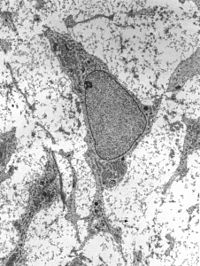
Photo from wikipedia
Summary As the most common form of joint disorder, osteoarthritis (OA) imposes a tremendous burden on health care systems worldwide. Without effective cure, OA represents a unique opportunity for innovation… Click to show full abstract
Summary As the most common form of joint disorder, osteoarthritis (OA) imposes a tremendous burden on health care systems worldwide. Without effective cure, OA represents a unique opportunity for innovation in therapeutic development. In contrast to traditional treatments based on drugs, proteins, or antibodies, stem cells are poised to revolutionize medicine as they possess the capacity to replace and repair tissues and organs such as osteoarthritic joints. Among different types of stem cells, mesenchymal stem cells (MSCs) are of mesoderm origin and have been shown to generate cells for tissues of the mesoderm lineage, thus, raising the hope for them being used to treat diseases such as OA. However, given their ability to differentiate into other cell types, MSCs have also been tested in treating a myriad of conditions from diabetes to Parkinson's disease, apparently of the ectoderm and endoderm lineages. There are ongoing debates whether MSCs can differentiate into lineages outside of the mesoderm and consequently their effectiveness in treating conditions from the ectoderm and endoderm lineages. In this review, we discuss the developmental origin of MSCs, their differentiation potential and immunomodulatory effects, as well as their applications in treating OA. We suggest further investigations into new therapies or combination therapies that may provide more effective treatment for bone and joint diseases. Furthermore, cell-based therapy and its associated safety and effectiveness should be carefully evaluated before clinical translation. This review provides updated information on recent approval of clinical trials and related applications of MSCs, and discusses additional efforts on cell-based therapy for treating OA and other joint and bone diseases.
Journal Title: Journal of Orthopaedic Translation
Year Published: 2017
Link to full text (if available)
Share on Social Media: Sign Up to like & get
recommendations!